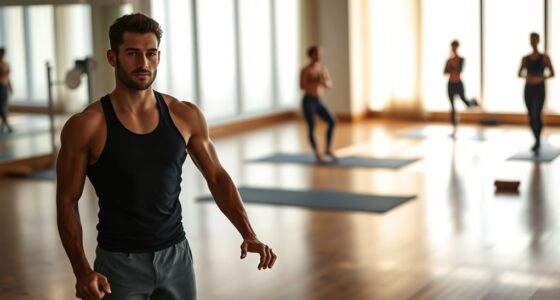Mindfulness is essential for actors, enhancing your focus, emotional depth, and connection to characters. Practicing mindfulness techniques like meditation and breathwork can help manage stress and anxiety, allowing for more authentic performances. You’ll notice improvements in your concentration and spontaneity on stage. Plus, it fosters a deeper understanding of your emotions, enriching your portrayal of characters. Discovering more about mindfulness can unlock your full potential as an actor and elevate your performances significantly.
Key Takeaways
- Mindfulness enhances actors’ presence, allowing for greater focus and emotional authenticity during performances.
- Regular meditation and breathwork help reduce anxiety, fostering a stable mental environment for actors.
- Sensory exercises and visualization deepen emotional connections with characters, enriching performances.
- Mindfulness promotes empathy, improving the authenticity of portrayals and audience engagement.
- Incorporating mindfulness techniques into training improves attention regulation and fosters creativity on stage.
Understanding Mindfulness in Acting
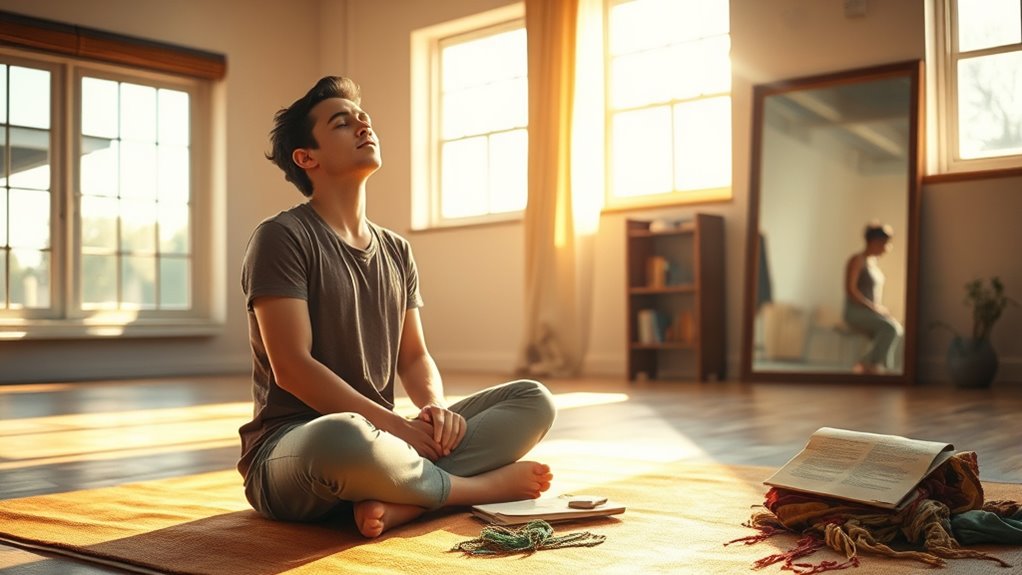
Mindfulness is a powerful tool for actors, enabling you to stay fully present and aware during performances. By practicing mindfulness, you cultivate essential qualities like focus, concentration, and awareness, which are crucial in the acting profession.
It helps you manage stress and anxiety, allowing you to navigate the emotional ups and downs of your craft with ease. Through meditation and other mindfulness techniques, you can develop a deeper understanding of your emotions, enhancing your ability to access and express them authentically.
This emotional regulation not only enriches your performances but also fosters a stronger connection with your characters. By being fully aware of your thoughts and feelings, you’ll create more nuanced portrayals that resonate with audiences.
Techniques for Cultivating Mindfulness
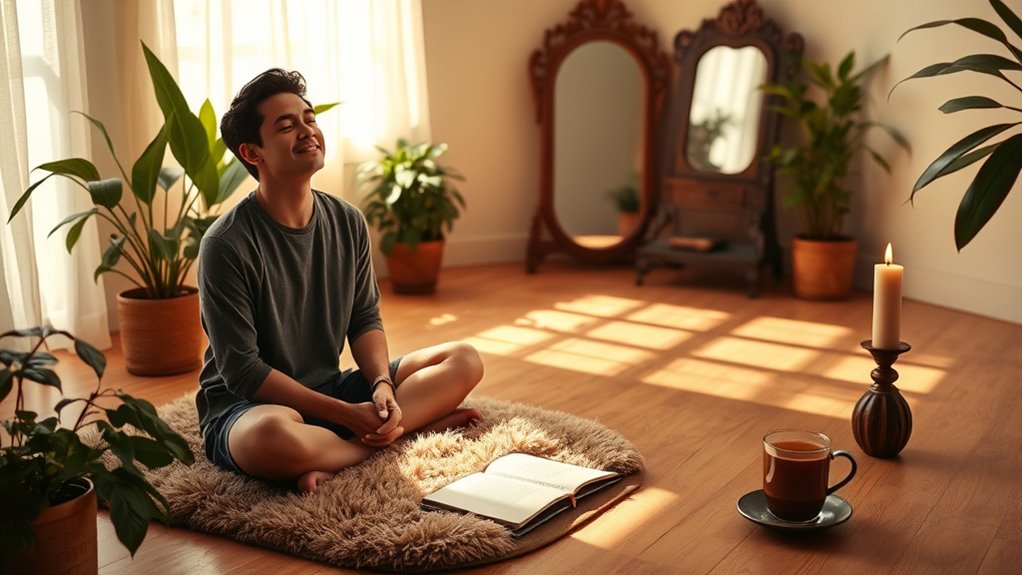
As you explore mindfulness in acting, various techniques can help you cultivate this practice effectively. Regular meditation strengthens your concentration and creates a stable inner environment.
Incorporate breathwork to calm your mind, as Stanislavski emphasized its importance for focus. Engage in sensory exercises to heighten your awareness and presence, while visualization practices deepen your connection with roles and emotions.
You can also integrate mindfulness into daily life, enhancing overall well-being. Consider using guided meditation, mindfulness apps, or journaling to reflect on your experiences.
Additionally, embrace nature to foster creativity. By applying these techniques, you’ll improve your focus, emotional regulation, and creativity, laying a solid foundation for your acting journey.
The Impact of Mindfulness on Performance
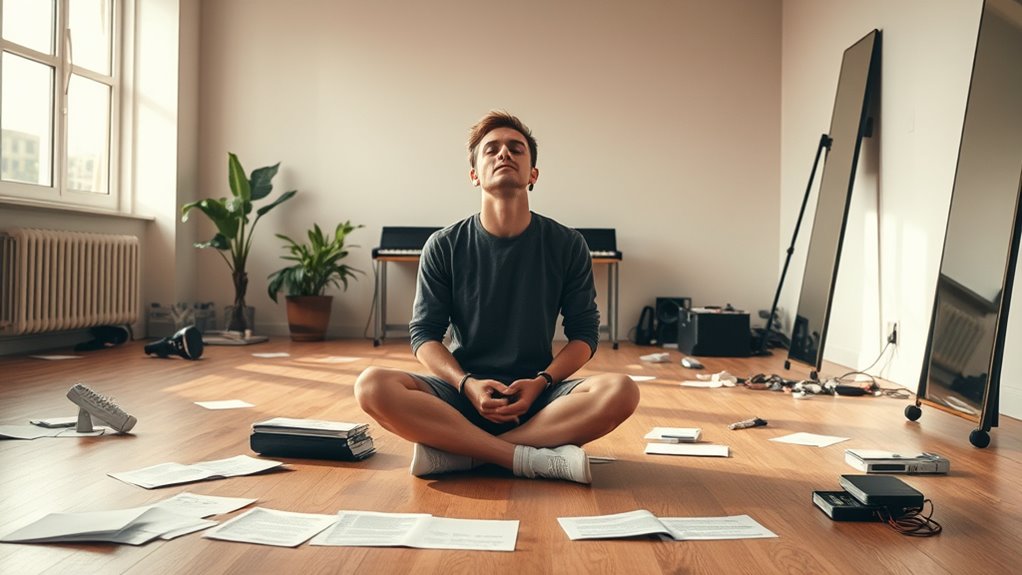
While honing your craft as an actor, you may find that incorporating mindfulness significantly enhances your performance quality. By practicing mindfulness, you improve your focus, allowing you to concentrate fully during performances and reducing distractions.
This heightened awareness fosters creativity, enabling you to be more spontaneous and present on stage. Additionally, mindfulness aids in expressing emotions authentically, making your portrayals more believable.
You’ll also develop increased self-awareness, helping you better understand your character and emotional depth. As you connect with the audience, being fully present enhances engagement and resonance.
Mental Health Benefits for Actors
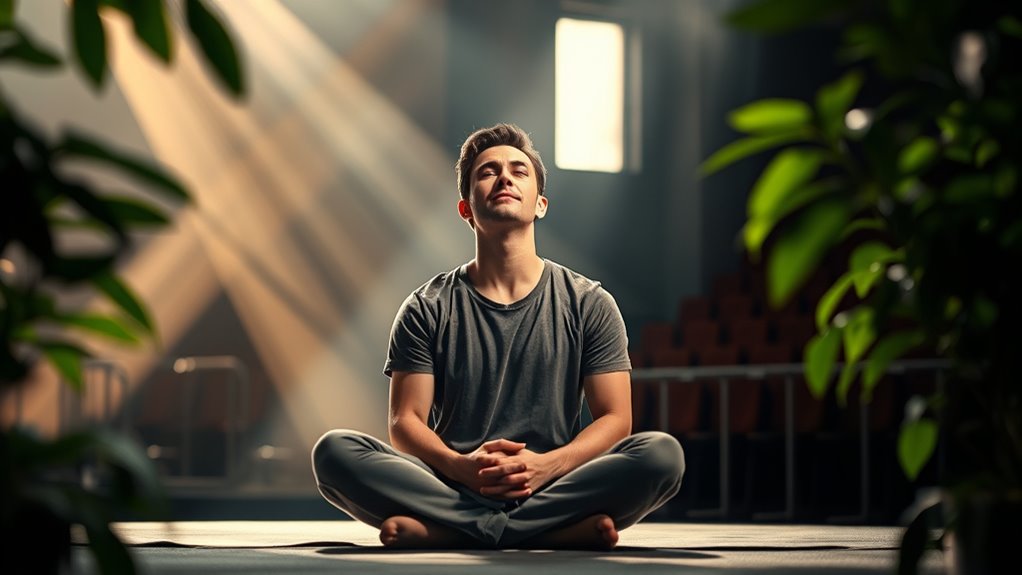
By practicing mindfulness, you can reduce stress and improve emotional regulation, helping you navigate the intense scrutiny and unpredictability of your career. It enhances your focus and concentration, crucial for delivering powerful performances. Mindfulness also fosters emotional awareness, allowing you to connect deeply with your characters and develop empathy, making your portrayals more authentic. Additionally, it serves as a form of therapy, promoting community and connection within the theater world. Incorporating stress management techniques may further enhance your ability to cope with the industry’s demands.
Integrating Mindfulness Into Acting Training
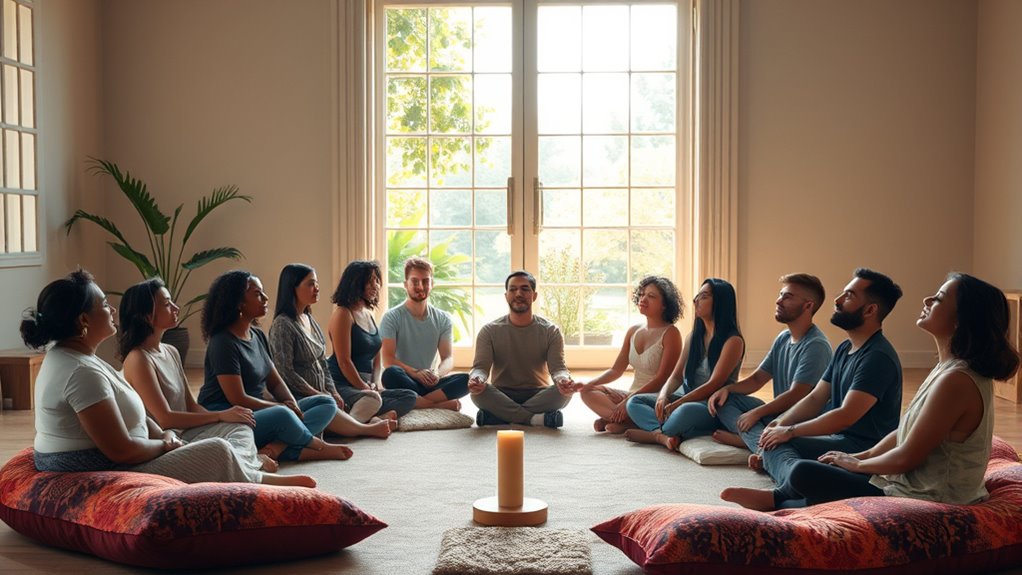
Integrating mindfulness into acting training offers a powerful tool for actors to enhance their craft and well-being.
By adopting Mindfulness-Based Performer Training (MBPT), you can improve your attention regulation onstage, which is vital for performance. Techniques like meditation help establish a stable inner environment, boosting your concentration and reducing anxiety.
Mindfulness in movement increases your body awareness, enhancing physical expression and vocal performance through breathing techniques. Engaging in mindful text interpretation deepens your connection with characters, while improvisational mindfulness fosters spontaneity.
As you weave these practices into your training, you’ll not only sharpen your focus and creativity but also cultivate greater self-awareness, allowing you to explore your emotional landscape safely and deeply. Incorporating deep breathing exercises into your routine can further enhance relaxation and focus, essential elements for effective performance.
Research Insights on Mindfulness in Performance
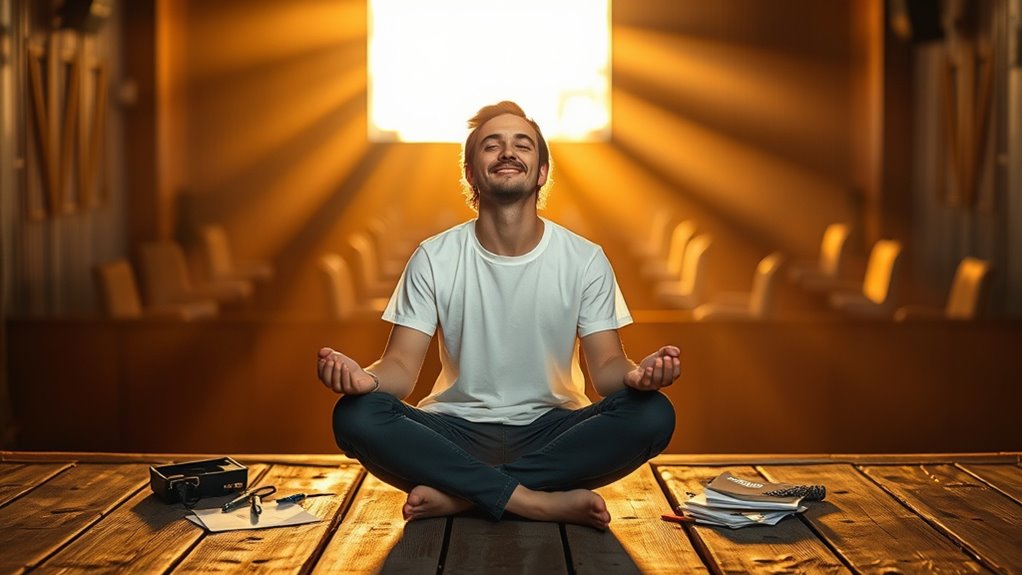
As you explore the impact of mindfulness on performance, you’ll find that it offers significant advantages for actors. Mindfulness enhances your focus and emotional regulation, reducing stress and anxiety.
Research shows that regular practice improves cognitive functioning, working memory, and executive abilities, allowing you to manage emotions better under pressure. This increased self-awareness can lead to greater emotional control during performances, helping you tackle pre-performance jitters.
Just like athletes, you can benefit from enhanced concentration and consistency in your craft. Mindfulness also promotes better impulse control and decision-making, which are crucial in the fast-paced world of acting.
Frequently Asked Questions
How Long Should I Practice Mindfulness Daily?
You should aim for short daily mindfulness sessions, starting with just 5-10 minutes.
As you get comfortable, gradually increase the duration. Consistency is crucial; practicing every day, even briefly, is more effective than longer, occasional sessions.
Try to fit mindfulness into your routine, whether during breaks or before bed.
Can Mindfulness Improve My Audition Success?
Absolutely! Imagine walking into an audition with the confidence of a lion and the focus of a laser beam.
Mindfulness can skyrocket your audition success by sharpening your concentration and calming your nerves. You’ll find it easier to connect with your character, manage your emotions, and showcase your talent without distraction.
With regular practice, you’ll not only improve your performance but also increase your chances of callbacks. Why not give it a shot?
What if I Struggle to Stay Present?
If you struggle to stay present, start by acknowledging that it’s a common challenge.
Focus on your breath; take deep, intentional breaths to ground yourself.
Try to connect with your surroundings by tuning into your senses—notice sounds, smells, and tactile sensations.
Practice regular check-ins with your thoughts and emotions, allowing yourself to feel without judgment.
Are There Specific Mindfulness Apps for Actors?
Think of mindfulness apps as a toolbox for your mind, ready to enhance your focus and calm your nerves.
Yes, there are specific apps that can help you. Insight Timer offers guided meditations, while Headspace provides structured sessions to ease stress. Calm features relaxation techniques, and Plum Village has mindfulness practices.
MindBell nudges you throughout the day to stay present. Each app gives you the tools to cultivate a mindful, focused approach.
How Can I Incorporate Mindfulness Into Rehearsals?
To incorporate mindfulness into rehearsals, start with breath awareness—take a few deep breaths to center yourself.
Engage in mindful listening, focusing fully on your scene partners without planning your responses.
Try brief check-ins to gauge everyone’s emotional state.
Use grounding techniques like feeling your feet on the floor to stay present.
Finally, encourage mindful stretching to connect with your body, promoting awareness and enhancing the overall rehearsal experience.
Conclusion
Incorporating mindfulness into your acting can transform not just your performances but your entire approach to the craft. Just as a mirror reflects light, mindfulness reflects your true self, allowing authentic emotions to shine through. By embracing these techniques, you’ll not only enhance your skills but also nurture your mental well-being. So, why not take a moment to breathe and be present? After all, the stage isn’t just a place to perform; it’s a space to connect.



